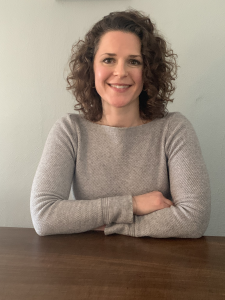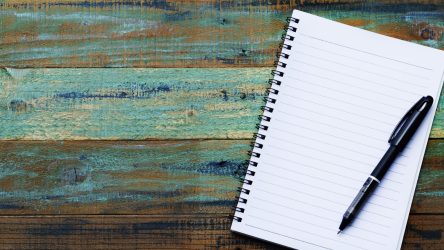
Writer, editor, and teacher Michelle Wildgen joins the Wisconsin Institute for Discovery’s (WID) Illuminating Discovery (ID) Hub as its next writer-in-residence. Wildgen brings over two decades of experience in fiction and nonfiction writing to her position at WID.
“Michelle comes to the residency as an accomplished and respected writer,” says ID Hub director Andrew Hanus. “She has published works which have been adapted for movies, taught instructional workshops for researchers at UW-Madison, and so much more. The expertise and charisma that Michelle brings to the residency will help to represent accurate science taking place in WID and elevate the program for future writers.”
Wildgen is the author of novels You’re Not You, But Not for Long, Bread and Butter, and Wine People (August 2023) as well as many works of fiction, personal essays, and food writing that have appeared in The New York Times, O Magazine, Best Food Writing, and Real Simple, as well as literary journals and anthologies. She served as the executive editor at Tin House Magazine for several years, has taught at UW-Madison, and in 2013, she co-founded the Madison Writers’ Studio which offers creative writing workshops and classes.
WID’s Writer-In-Residence Program aims to connect storytellers with scientists, which excites Wildgen. When writing fiction, she draws inspiration from unfamiliar environments. Her last novel, Bread and Butter, and the forthcoming Wine People were shaped by research into the restaurant and wine importing industries, a topic she first began exploring when she worked at L’Etoile after graduating from UW-Madison. Now she is ready to dive into the vast world of science and learn from WID’s diverse researchers as she begins her next novel.
“This opportunity to immerse myself in a world I don’t know is like catnip for a fiction writer,” Wildgen says. “I’m really interested in looking at a world of real scientific research compared to the part of the beauty and wellness industry that sells itself as scientific but may not have much science behind it. I’ve been thinking about how I could set the fascinating science that I’m going to be learning about [at WID] against something completely different.”
Wildgen’s storytelling will be bolstered by what she learns during her residency–especially as it pertains to science that pushes against popular wellness trends–but she will also be supporting WID’s researchers in a number of ways. Through the ID Hub, she will host a hands-on workshop to improve academic, creative, or professional writing practices, leaving participants more productive and less stressed. Wildgen will also co-lead workshops with postdoctoral researcher Julia Nepper to help graduate students tell their personal journeys of becoming scientists.
“Humans have used stories for millennia to make sense of the world and to share culture, values, and norms,” Nepper says. “Although many scientists agree that ‘building a story’ is an effective method for sharing scientific findings, they rarely have much training in the art of storytelling. We hope these workshops will help scientists apply storytelling tools to normalize the experiences and tribulations of science and better understand their underlying goals, motivations, and struggles. Then, we can begin to map out the rest of our story and move confidently towards our next steps–whatever we may be seeking from the future.”
Beyond workshops, Wildgen also hopes to connect literary writers and scientists to illuminate scientific concepts in fiction during her residency. This idea sparked her interest while she finalized Wine People and thought about the chemistry and microbiology behind how wine is made. Science-writing fusion projects could strengthen authors’ works and give researchers an outlet to engage with artists and contribute to accurate portrayals of science in media. These collaborations would also give readers a more authentic perspective and richer context of the writing.
WID students, faculty, and staff are encouraged to talk to Michelle about project or event ideas or for writing and editing assistance. She is eager to share her vast expertise with the WID community.
“Michelle is the quintessential writer-in-residence–she is an accomplished, published author, she is endlessly curious, and she is generous about sharing her talents in teaching and editing,” says director of the Wisconsin Institute for Discovery Jo Handelsman. “A fantastic addition to WID!”
Upcoming Workshop:
Improve Your Writing Practice
March 24, 2023 2:00-4:00PM
Orchard View Room
Registration is open to the public
–Martel DenHartog


You must be logged in to post a comment.